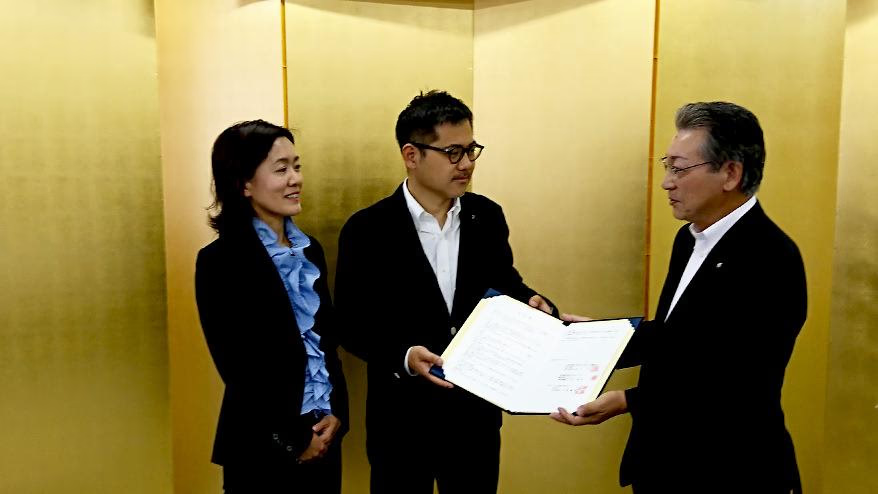Hello, this is Vice President Nagai.
It's already been three months since I moved to Suo-Oshima Town, Yamaguchi Prefecture.
I've gotten used to life here, and thanks to the 100m fiber optic line, which seems smoother than the Yoyogi office, I don't feel much physical hindrance to my work. I do miss eating out less, but these days I'm impressed by the deliciousness of the fresh vegetables I get from my neighbors.
The "Advancement Agreement Signing Ceremony" was held
On May 22nd, the company's president, Mr. Hayashi, and director, Mr. Sakuyama, came to town to sign an agreement with Suo-Oshima Town regarding the establishment of a satellite office.
This time, I would like to report on the signing ceremony.
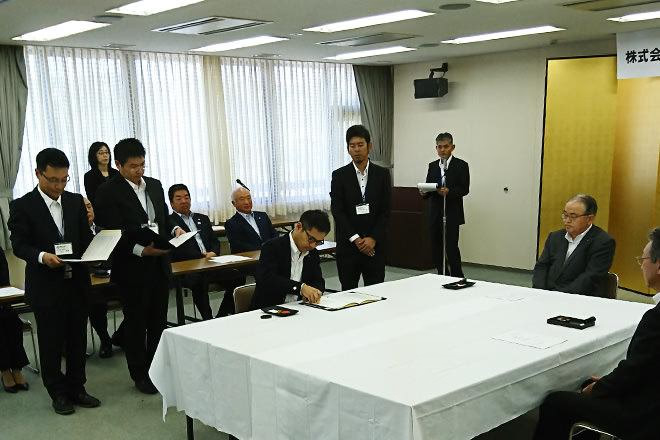
In a solemn atmosphere, Hayashi signs the expansion agreement.
First, Hayashi gave a talk about Monosus's vision for "how to work and live."
Whether in the city, the countryside, or overseas. Being able to choose how you work and live by your own will, and acquiring the skills to make that a reality. This will be important for future work styles, and as a company we want to provide options for that. Also, rather than seeking temporary results because it's a trend, we want to slowly but surely build our new base in relationships with people and communities that we can walk alongside.
As I listened to Hayashi's speech, I felt a sense of responsibility and wanted to make this relationship with Suo-Oshima Town exactly like that.
Next, we received many words of expectation from Mayor Shiiki of Suo-Oshima Town, Vice Governor Hironaka of Yamaguchi Prefecture, and guest of honor, Yamaguchi Prefectural Assembly Speaker Yanagi, and it was a day in which we once again pledged to work hard in the future.
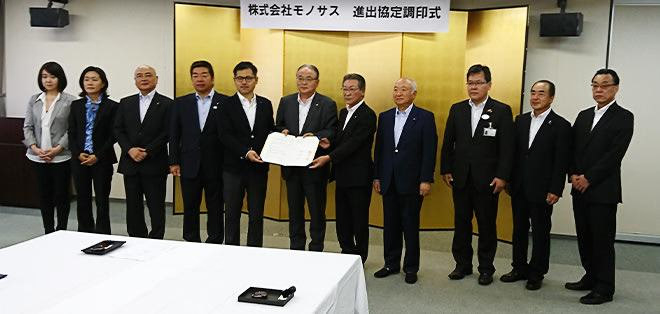
Hayashi (center left), Sakuyama (far left), and Nagai (second from the left) pose for a commemorative photograph with Suo-Oshima Town Mayor Shiiki (center right), Yamaguchi Prefecture Vice Governor Hironaka (center), and others after the signing ceremony.
The work environment surrounding the town
To begin with, we were approached about this project six months ago. Last fall, when the plan to "create a place to work in Suo-Oshima" was becoming a reality within the company, we heard that Yamaguchi Prefecture was providing support to companies considering opening satellite offices in mountainous areas, and we decided to consult with them.
At that time, we heard that many young people who wanted to stay in their hometowns could not find jobs and so went to work in the city. I think this is a common issue in many rural areas, but it was a fresh surprise for us, as we were struggling to find people to hire in Tokyo at the time.
Indeed, looking back at the recruitment situation at Monosus, while it was difficult to attract applicants for positions in Tokyo, we received several to even ten times as many applications for positions based on working in Kamiyama Town, Tokushima Prefecture, where we had already established a satellite office. However, it is also true that at the time, I only thought of it as an individual situation, that "there are people who want to work in the countryside."
In fact, when I heard that even administrative units were feeling a sense of crisis, I was surprised and thought, "I really want to work in my hometown, but the only job opportunities I have are in the city. There are so many people who have few options for how they want to work." And it renewed my resolve to expand into the area.
I was born and raised in Kawasaki City, Kanagawa Prefecture, and have only ever lived in Tokyo and Kawasaki since then. When I graduated from school and changed jobs several times, I never considered working anywhere other than Tokyo.
However, that was just because I happened to be born and raised in a city, and there were many job options nearby. I realized once again that being able to choose from a wide range of industries and occupations in the place where you were born and raised is rather a unique situation in Japan as a whole.
The difference in "job options"
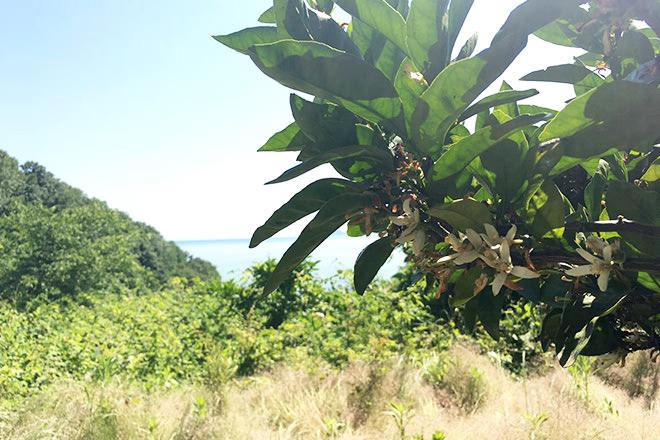
What if I had been born and raised on Suo-Oshima?
For example, when I decided I wanted to work in web development like I do now, I would have had to leave the relationships I had built with my friends, family, and neighbors, even though I didn't want to, and live in an unfamiliar place.
Furthermore, it seems that the change in attitude among the generation younger than me is accelerating beyond simply wanting to remain in their hometown.
In the aforementioned recruitment in Kamiyama Town, Tokushima Prefecture, of course there are applications from Tokushima Prefecture and its surrounding areas, but there are also many applications from people living in Tokyo and other so-called big cities. Even among people who were born, raised, worked and lived in cities, there are some who are questioning their current way of life and are starting to look for different ways of working and living. I think that one of these options is "working in the countryside."
Since moving to Suo-Oshima, I have realized that with the development of the Internet and logistics, the difference in physical "convenience" between urban and rural areas seems to be becoming increasingly small.
The selection of products at supermarkets and convenience stores is almost the same in Tokyo and Suo-Oshimacho, and online shopping sites like Amazon deliver anything and everything to Chikamuro, Suo-Oshimacho, the city where there are not even a single store, the next day after ordering, free of charge. Most of the TV programs I watched in Tokyo can also be watched here in Suo-Oshimacho, and when it comes to online information, it's only natural that it's available anywhere. If anything, the internet speed feels faster and more comfortable than in the Yoyogi office. (This is probably because, even with the same internet speed, the number of people using it is extremely small (lol).)
While the difference in convenience is disappearing, the last major difference that remains between Tokyo and the regions may be "job options."
It is true that the jobs available here on Suo-Oshima seem to be limited to a certain extent, such as traditional farming and fishing, hotel and restaurant staff in the tourist industry, welfare and medical services, civil engineering, etc. All other jobs advertised are for jobs in nearby cities outside the island.
I feel that of all the things people need to continue living there, the thing that is most lacking in rural areas is "jobs."
An opportunity to think about "how to work" and "how to live"
My working here in Suo-Oshima will not only create jobs as a Monosus satellite office, but will also serve as an example that shows people that "this is how you can work in Suo-Oshima," and "this is how you can make efforts to make the distance from Tokyo feel casual, even in the countryside." I hope that it will give people who currently think that they are doing work that can only be done in the city an opportunity to consider other options.
After the signing ceremony was successfully completed, we visited Busicom Co., Ltd. , a company with a satellite office in Suo-Oshima Town. Although it has only been about a year since the office opened last year, there are already about 10 employees, mostly from the local area. As we talked, they told us, "It would be great if various types of businesses were established in Suo-Oshima."
While listening to the thoughts of the various people living on Suo-Oshima, we would like to proceed with the construction of a satellite office so that we can become one of the "various industries and occupations" in Suo-Oshima town.
We would like this satellite office to provide new work options here in Suo-Oshima-cho, and to provide another new "lifestyle option" for Monosas in Yoyogi.
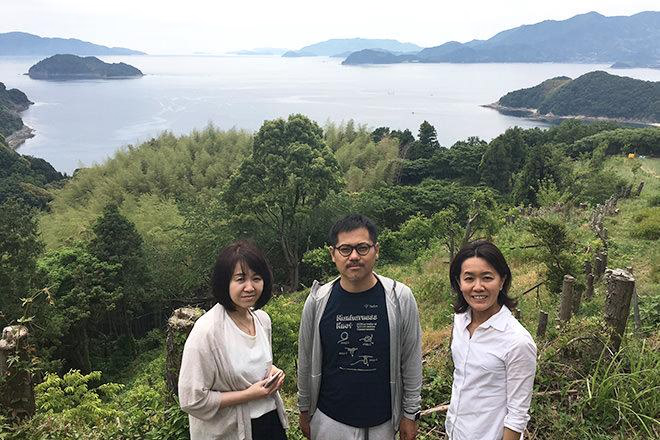
The Monosus crew (from left: Sakuyama, Hayashi, Nagai) enjoying a tour of Suo-Oshima
